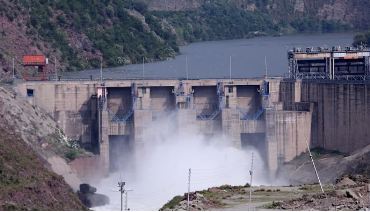Pakistan has denied involvement in IIOJK attack, but accord hasn’t been revived despite ceasefire
DNA
ISLAMABAD: India is considering plans to dramatically increase the water it draws from a major river that feeds Pakistani farms downstream, as part of retaliatory action for a deadly April attack on tourists that New Delhi blames on Islamabad, according to four people familiar with the matter.
Delhi suspended its participation in the Indus Waters Treaty of 1960, which governs the usage of the Indus river system, shortly after 26 civilians in Indian Illegally Occupied Jammu and Kashmir (IIOJK) were killed.
Pakistan has denied involvement in the incident, but the accord has not been revived despite the two nuclear-armed neighbours agreeing on a ceasefire last week following the worst fighting between them in decades.
After the April 22 attack, Indian Prime Minister Narendra Modi ordered officials to expedite the planning and execution of projects on the Chenab, Jhelum and Indus rivers, three bodies of water in the Indus system that are designated primarily for Pakistan’s use.
One of the key plans under discussion involves doubling to 120km the length of the Ranbir canal on the Chenab, which runs through India to Pakistan’s agricultural powerhouse of Punjab, two of the people said. The canal was built in the 19th century, long before the treaty was signed.
India is permitted to draw a limited amount of water from the Chenab for irrigation, but an expanded canal — which experts said could take years to construct — would allow it to divert 150 cubic metres of water per second, up from about 40 cubic metres currently, the four people said, citing official discussions and documents they had seen.
Details of the Indian government’s deliberations on expanding Ranbir have not previously been reported. The discussions started last month and continue even after the ceasefire, one of the people said.
The Indian ministries responsible for water and foreign affairs, as well as Modi’s office, did not respond to Reuters’ questions. Indian hydropower giant NHPC, which operates many projects in the Indus system, also did not respond to an email seeking comment.
Modi said in a fiery speech this week that “water and blood cannot flow together,” though he didn’t refer to the treaty. Indian foreign ministry spokesperson Randhir Jaiswal told reporters Tuesday that India “will keep the treaty in abeyance until Pakistan credibly and irrevocably abjures its support for cross-border terrorism”.
Foreign Minister Ishaq Dar told lawmakers this week that the government had written to India arguing that suspending the treaty was unlawful and that Islamabad regarded it as remaining in force.
Islamabad said after India suspended the treaty in April that it considered “any attempt to stop or divert the flow of water belonging to Pakistan” to be an “act of war.”
About 80% of Pakistani farms depend on the Indus system, as do nearly all hydropower projects serving the country of some 250 million.
Any efforts by Delhi to build dams, canals or other infrastructure that would withhold or divert a significant amount of flow from the Indus system to India “would take years to realise,” said water security expert David Michel of the Washington-based Centre for Strategic and International Studies.
But Pakistan has had a preview of the kind of pressure it could face from India: Water at a key receiving point in Pakistan briefly fell by as much as 90% in early May after India started maintenance work on some Indus projects.

















